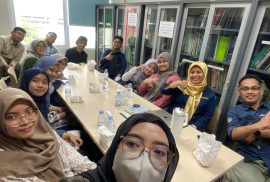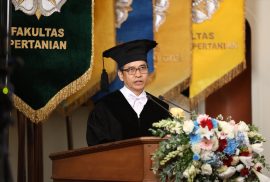The Department of Agricultural Microbiology held a student evaluation meeting on Wednesday, January 28, at 9:00 a.m., located at the Agricultural Microbiology Department Library, 4th floor of the AGLC Building. The meeting was attended by Agricultural Microbiology students from the 2019 and 2020 cohorts, along with the Head of Department, Mr. Saifur, and the Head of the Study Program, Ms. Desi. This activity served as an open forum between the department and students to discuss academic progress and challenges encountered during their studies.
The Department of Agricultural Microbiology, Faculty of Agriculture, Universitas Gadjah Mada (UGM), held the Year-End Gathering of Agricultural Microbiology on Tuesday, 31 December 2025, at the Integrated Agrocomplex Laboratory, 1st Floor, Faculty of Agriculture UGM. The event commenced at 1:00 PM WIB and was attended by all lecturers as well as research students of the Department of Agricultural Microbiology who are currently conducting their undergraduate thesis research.
This year-end gathering was organized as a moment of togetherness as well as a reflection on the Department of Agricultural Microbiology’s journey throughout 2025. The event also served as an occasion to bid farewell to two staff members of the Department of Agricultural Microbiology who had completed their terms of service, as a form of appreciation for their dedication, contributions, and service to the department.
The Department of Agricultural Microbiology, Faculty of Agriculture, Universitas Gadjah Mada (UGM), held a graduation assessment (yudisium) on Wednesday, December 24, 2025, at the Library of the Department of Agricultural Microbiology, AGLC Building, 4th Floor. The event took place from 1:00 to 2:00 p.m. WIB and was attended by all lecturers of the Department of Agricultural Microbiology.
On this occasion, one student was officially declared to have graduated, namely Muhammad Prakosa Damarsejati. During the event, Dr. Ngadiman delivered words of advice (unen-unen) to the graduate. He emphasized that graduation is not the end of the learning process, but rather the beginning of greater responsibility within society. Graduates are expected to apply their knowledge of microbiology wisely, adaptively, and responsibly, while continuing to develop themselves in line with the dynamics of scientific advancement and societal needs.
The Department of Agricultural Microbiology held a sarasehan gathering on Saturday, December 6, from 09.00 to 12.00 WIB. The event invited the entire academic community—including lecturers, educational staff, students, alumni, and retirees—as a way to strengthen intergenerational connections and foster warm, open communication. Carrying the theme “Taut Rasa, Tumbuh Asa” (Binding Feelings, Growing Hope), the sarasehan took place at the Prof. Harjono Danoesastro Auditorium and was filled with a spirit of togetherness and appreciation.
The Department of Agricultural Microbiology, Faculty of Agriculture, Universitas Gadjah Mada (UGM), celebrated an important milestone during the Graduation Ceremony for Period I, held on Wednesday, 26 November 2025. On this occasion, thirteen students were officially conferred their bachelor’s degrees after successfully completing their academic and research journeys in the field of agricultural microbiology.

The thirteen graduates are: Chandra Rizqullah, Isyhar Haafish, Retno Cahyani, Naufal Fathan, Amanda Safira, Hanifa Afifia, Hazana Insyi’ta Sahla, Yena Amalia, Ahadyah Anggraeni Safedi, Rania, Hafsah Dwi Nur Haliza, Miftakhul Ilmi Nurul Fauziyah, and Masfira. Each of them completed their studies with various research achievements that contribute to scientific advancement, particularly in microbiology related to sustainable agriculture, environmental management, and biotechnology.
PERMAHAMI once again carried out one of its flagship programs, Microbiology Goes to School, organized by the Department of Social and Community Affairs. This educational initiative took place on Monday and Tuesday, 17–18 November 2025, from 14:00 to 15:20 WIB, at four partner schools: SMAN 3 Yogyakarta, SMA IT Baitussalam, SMAN 1 Sleman, and SMA Muhammadiyah 1 Yogyakarta. Through collaboration with senior high schools in Yogyakarta and surrounding areas, this program aims to provide students with a basic understanding of general microbiology and agricultural microbiology, share experiences as students of Agricultural Microbiology, and introduce career prospects within the field.
Two students from the Department of Agricultural Microbiology, Uways Irfany Adiprawira and Yori Idmaldi Arif, received a valuable opportunity to participate in the Sakura Science Program (SSP) organized by the Japan Science and Technology Agency (JST). Over the course of 12 days, starting on November 4, 2025, they experienced firsthand the academic atmosphere at Ibaraki University, Japan. The program, titled “New Approaches to Disease Control in Tropical Crops,” was not just an ordinary training activity—it was a comprehensive immersion that combined learning, experimentation, and exploration of Japanese culture and technological advancement.
Universitas Gadjah Mada (UGM) reaffirmed its commitment to advancing science and technology through the inauguration of Prof. Ir. Donny Widianto, Ph.D. as a Professor in Microbial Biotechnology at the Faculty of Agriculture. The inauguration ceremony was held on Thursday, October 30, 2025, at the UGM Central Building, and was broadcast live via the official YouTube channel of Universitas Gadjah Mada. The event was attended by members of the academic community, family, and invited guests from various institutions.
The Department of Scientific Affairs, in collaboration with the Department of Entrepreneurship of the Association of Agricultural Microbiology Students (PERMAHAMI), Faculty of Agriculture, Universitas Gadjah Mada, successfully held the Microbiome Creation Product (MCP) 2025 event on Saturday, 25 October 2025. Held at the Integrated Laboratory of the Agrocomplex, Faculty of Agriculture UGM, this event carried the theme “The Power of Probiotics: From Fermentation to Innovation”, aimed at enhancing participants’ understanding of the role of microorganisms in food production and providing hands-on experience in producing a fermented product—yogurt. The program featured lectures, a talk show, and a practical yogurt-making session as a form of educational outreach on fermentation science and its business potential.
The Association of Agricultural Microbiology Students (PERMAHAMI), Faculty of Agriculture, Universitas Gadjah Mada, successfully held its 48th Anniversary Celebration on Monday, 20 October 2025, at the Harjono Danoesastro Auditorium. Carrying the theme “Sangama Samskara,” the event served as an important moment to celebrate the organization’s long journey while strengthening the sense of unity and togetherness among Agricultural Microbiology students.
The celebration featured various activities, including a thanksgiving ceremony with tumpeng cutting, performances by each student cohort, and an award presentation for outstanding contributors. The theme “Sangama Samskara” reflects the merging of values, hopes, and spirit passed down through generations of students, making the event a meaningful space to reinforce PERMAHAMI’s collective identity.










